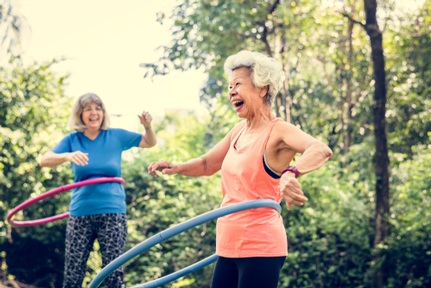Elderly should be encouraged to 'play and have fun' and 'be silly'
Baroness Sally Greengross is calling for older people to be given more opportunities to play and have fun, saying we need to combat the assumption that play ends with adulthood.

Play has an essential role in boosting physical and mental health, yet ageism means “play is reserved for the youngest of society”, according to the chief executive of the International Longevity Centre (ILC-UK).
She was speaking at the ILC Future of Ageing conference where campaigners and experts on longevity, discussed the importance of play throughout life. Baroness Greengross said: “All the evidence points towards the obvious: We don’t stop wanting to play and have fun just because we reach a particular age.
“We want, and indeed need, to play throughout the life course to maintain happy and healthy lifestyles. Rather than relying on ageist assumptions that play is reserved for the youngest of society, we need to remove the stigma surrounding play in later life to give all members of society the opportunity to make the most of the benefits longevity can yield.”
Manufacturers are wising up to the growing adult market wanting to distract themselves from the stresses of life by buying toys. Colouring books for adults have become a big hit and Lego has even formed a brand called Lego Forma dedicated to making toys for grown ups.
In addition, social prescribing has become the latest buzzword with it being seen as a panacea for loneliness and depression, with the health and social care secretary, Matt Hancock, calling for GPs to reduce medical prescribing by introducing social prescribing instead, encouraging older people to regularly engage in creative and community activities.
Janet Morrison, chief executive of Independent Age and chair of the Campaign to End Loneliness, also spoke at the conference, arguing that activities such as the arts and physical activity should not be limited by chronological age.
She said: “There's more to life than being washed, dressed and fed. Somehow that gets lost in translation when we provide activities for older people. Why is that? Because we have a poverty of aspiration for what a good later life looks like.
“We forget that older people, like you and me, enjoy opportunities to play and have fun, be silly, be creative, to sing or dance, to paint, to laugh, to feel the fresh air in their lungs and the sun on their skin.
“So I'm always inspired when I hear about choirs and artists-in-residence in care homes, silver comedy, dance troupes like Green Candle or Sadlers Wells, and 'Posh club' cabaret tea dances. I love those that give time for fun and laughter, friendships to form, and enable the voices of older people to be heard.”

Kenny Butler, head of Health and Wellbeing Development at ukactive, which promotes active lifestyles, wants to see more done to facilitate opportunities for people at all stages in life to engage in fun activities.
He said: “No matter what your age, those who play and have fun stand the best chance of maintaining happy, healthy lives. It doesn’t matter how you get active so long as you keep moving.
“With 90 per cent of the UK population living within 20 minutes of a gym, leisure centre or wellness hub, ukactive is helping to reimagine these places to ensure they are welcoming, inclusive and accessible. By focusing on the needs of an ageing population with co-morbidities we can have a real impact on the health and wellbeing of those who need these facilities and services most.”
Paul Cann, chair of Entelechy Arts urged governments, charities and community organisations to ensure more activities are made accessible and available for older people.
He said: “Play is fundamental to us all whatever our age. Understandably but sadly public policies and practices for older people lay much of the emphasis on safety, comfort, nutrition and money to get by. We need to ensure that whatever your age, you have something to get out of bed for, whether that's a dance group, an art class, or a walking group, whatever fires you up.
“Social prescribing is our big opportunity now. At the heart of the new loneliness strategy, all GP practices will be putting in place arrangements to guide patients towards activity that will help them live life and not simply survive to the next round of medication. This should be great, as long as our 'social prescribers' are equipped with all the communication skills and understanding of the available opportunities to be truly expert guides."
Latest News
 29-Jul-24
Dementia Bus gives carehome.co.uk staff insight into life with dementia
29-Jul-24
Dementia Bus gives carehome.co.uk staff insight into life with dementia
 01-Mar-24
Find out the top care homes in 2024
01-Mar-24
Find out the top care homes in 2024
 21-Mar-23
UK's top care homes in 2023 revealed
21-Mar-23
UK's top care homes in 2023 revealed
 03-Jan-23
carehome.co.uk launches free care helpline
03-Jan-23
carehome.co.uk launches free care helpline
 13-Dec-22
5 mins with Emily Whitehurst, chief operating officer for Constantia Healthcare
13-Dec-22
5 mins with Emily Whitehurst, chief operating officer for Constantia Healthcare